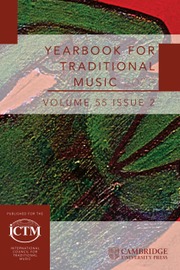Article contents
Déjà Vu? Folk Music, Education, and Institutionalization in Contemporary England
Published online by Cambridge University Press: 07 March 2019
Extract
In a nation on the periphery of Europe, in a region most distant from the capital, the country's indigenous musical traditions are undergoing a process of institutionalization. A large proportion of the nation's population fears the loss of their ancient customs and national identity to the ever rising tide of foreign cultural influences. The locality itself, however, enjoys both a strong regional identity and a unique musical repertory, a repertory that plays a central role in both the text and context of the institutionalization in question. The resultant institution is multifaceted—its activities include: the collation and publication of music recordings and transcriptions; the promotion of performances by locally and nationally revered folk musicians; the creation and direction of a folk orchestra; and, most importantly, an extensive folk music education programme, culminating in a nationally recognized qualification. The organization has been quietly accused by other folk musicians of standardizing and formalizing the music it professes to support. Nonetheless, it receives financial support from the state departments for education and culture.
- Type
- Articles
- Information
- Copyright
- Copyright © 2007 by the International Council for Traditional Music
References
References Cited
- 3
- Cited by




